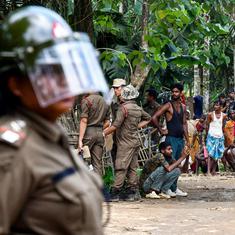I am writing this as an act of love. I was born in India, and I love India with all my being. But this country that I love is facing the gravest threat to its democracy since its founding.
Indian democracy is one of the 20th century’s greatest achievements. Over 75 years, we built, against great odds, a nation that for the first time in its 5,000-year history empowered women and the Dalits, people formerly known as untouchables. We largely abolished famine. We kept the army out of politics. After independence, many people predicted that we would become Balkanised. Yugoslavia became Balkanised, but India stayed together. No small feat.
But I write this today to tell you: things in India are more dire than you realise. India is a country that is majority Hindu, but it is not officially a Hindu state. The people who are in power in India today want to change this. They want India to be a Hindu ethnocratic state, where all other religions live by Hindu sufferance.
This has practical consequences: people of other religions are actively harassed, even lynched on the streets; their freedom to practice their religion in their own way is circumscribed. And when they protest, they are jailed and their houses bulldozed. Most worrying, much of the judiciary seems to be sympathetic to the Hindu nationalist agenda, and issues its verdicts accordingly.
There is also sustained and systematic harassment of writers, journalists, artists, activists, religious figures – anyone who questions the official narrative. We who have attached our names here are taking great personal risk in writing this: our citizenship of India could be revoked, we could be banned from the country, our property in India seized, our relatives harassed.
There are many others who think like we do but have told us they cannot speak out, for fear of the consequences. I never thought I’d use the word “dissident” in describing myself and my friends who have compiled this document. I thought that word only applied to the Soviet Union, North Korea, China.
It is crucial that India remains a democracy for all its citizens. India is not Pakistan, Iran, Afghanistan. Not yet. A lot of India’s standing in the world – the reason we are included in the respectable nations, the reason our people and our tech companies are welcome all over the world – is that we are seen, unlike, say, China, as being a multi-ethnic democracy that protects its minorities.
With over 200 million Indian Muslims, India is the third largest Muslim country in the world. There are 30 million Indian Christians. There are Sikhs, Buddhists, Jains, Zoroastrians, Atheists. They are as Indian as I am – a Hindu who’s proud of being a Hindu, but not a Hindu as Prime Minister Narendra Modi and the Bharatiya Janata Party seek to define me.
When countries safeguard the rights of their minorities, they also safeguard, as a happy side effect, the rights and wellbeing of their majorities. If a judiciary forbids discrimination against, say, Muslims, it is also much more likely to forbid discrimination against, say, LGBTQ+ people. The obverse is also true: when they do not safeguard the rights of their minorities, every other citizen’s rights are in peril.
The alienation of Indian Muslims would be catastrophic, for India and the world. They are being told: you are invaders, this is not your country, go back to where you came from. But Indian Muslims did not come from elsewhere; they were in the country all along, and chose which God to worship. After the Partition of India and Pakistan in 1947, they voted with their feet; they chose to stay, and build a nation.
The challenges facing India in the next 75 years are colossal, perhaps even greater than the first 75 years. This year, northern India saw the hottest temperatures in history, reaching 49 degrees Celsius. Next year looks to be even hotter. By the middle of the century, New Delhi could become uninhabitable.
The country also has an enormous, restive, and largely unemployed youth population – half of its population is under 25. But only 36% of the working-age population has a job. To meet these challenges, it is crucial that the country stay united, and not fracture along religious lines, spend its energies building a brighter future instead of darkly contemplating past invasions.
In this time when country after country is turning its back on democracy, India has to be an example to countries around the world, this beautiful dream of nationhood expressed in the Hindu scriptures as “Vasudhaiva Kutumbakam” – the whole earth is a family. We should all be rooting for this incredible experiment in multiplicity to work. As goes India, so goes democracy.
Suketu Mehta is the author of Maximum City: Bombay Lost and Found, a Pulitzer Prize Finalist, and This Land is Our Land: An Immigrant’s Manifesto. He teaches journalism at New York University.
Read all the contributions to the PEN project here.










